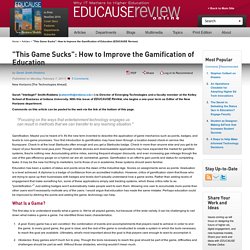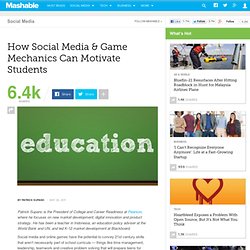

“This Game Sucks”: How to Improve the Gamification of Education (EDUCAUSE Review. Sarah "Intellagirl" Smith-Robbins (sabsmith@indiana.edu) is Director of Emerging Technologies and a faculty member at the Kelley School of Business at Indiana University.

With this issue of EDUCAUSE Review, she begins a one-year term as Editor of the New Horizons department. Comments on this article can be posted to the web via the link at the bottom of this page. "Focusing on the ways that entertainment technology engages us can result in methods that we can transfer to any learning situation. " Gamification. Maybe you've heard of it. Education has been a system of status and points since the dawn of the Industrial Age. What Is a Game? The first step is to understand exactly what a game is.
A goal: Every game has a win condition: the combination of events and accomplishments that players need to achieve in order to end the game. True gamification requires that all three characteristics be present. Is Higher Education Already a Game? Last is the issue of collaboration and competition. Notes. Motivate. Play. - Eight Mechanics to Enhance Cooperation in Multiplayer Games. As we move through the world we sometimes find ourselves in interactions where what is best for ourselves is not best for those around us. Pollution, overuse of resources, the maintenance of roads, and welfare for the poor and unfortunate are all examples. This type of situation is often referred to as an n-player social dilemma: there are a number of players(n), there is a temptation for individuals to act selfishly, and selfish behavior has negative consequences for the group as a whole. In virtual worlds it may seem that we are fortunate because resources can be unlimited.
If energy shortage is a problem, just program in unlimited energy. If pollution is a problem, just design production so there is no waste or byproduct. Besides situations with scarce resources, social dilemmas can also occur as a result of pollution, which can occur via undesirable behaviors like griefing or ninja looting – see my post on communication channels in Brink. Social Dilemma Research Space Reputation. QR Code Treasure Hunt Generator. Coding conduct. Don't Play Games With Me!

Don't Play Games With Me! Promises and Pitfalls of Gameful Design. Invited Closing Keynote, Web Directions @Media, May 27, 2011, London, UK. In 1960, Milton Bradley published »The Game of Life«: a capitalist wet dream of a board game, won by the lucky one who retired richest. Today, »gamification« vendors take Milton Bradley seriously. But a quick glance at current »gamified« applications shows that they drastically fall short of the promise of games and play. Sebastian-deterding. How Social Media & Game Mechanics Can Motivate Students. Patrick Supanc is the President of College and Career Readiness at Pearson, where he focuses on new market development, digital innovation and product strategy.

He has been a teacher in Indonesia, an education policy adviser at the World Bank and UN, and led K-12 market development at Blackboard. Social media and online games have the potential to convey 21st century skills that aren’t necessarily part of school curricula — things like time management, leadership, teamwork and creative problem solving that will prepare teens for success in college and beyond. Making the transition between a highly structured environment in high school to a self-driven, unstructured environment in college can prove a huge challenge for many kids. Educators spend a lot of time thinking about how to fix this problem.
The solution doesn’t lie solely with games, but a lot of the psychology that motivates teens to play games holds potential. The Status Update and Checkins Leaderboards Leveling Up.